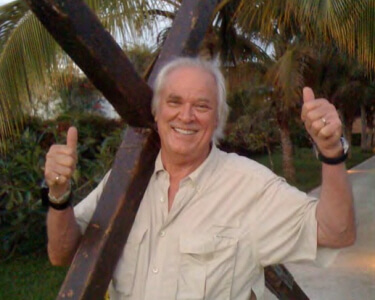
The Cross: The Arthur Blessitt Story, which documents the evangelist’s 39-year journey through 315 nations, premieres tonight at the Holy Land Experience in Orlando, Fla., and at Grauman’s Chinese Theatre in Los Angeles. The $1.7 million documentary opens nationwide on Friday.
“When you finish [watching the film], our prayer is that everyone would either fall at the foot of the cross or take up their own cross,” said Blessitt, who will ceremonially raise the cross outside Grauman’s tonight during the Hollywood premiere.
The event will be broadcast live on the Trinity Broadcasting Network, which also owns the Holy Land Experience.
“This is going to be a unique and historical event at two locations thousands of miles away,” said Paul Crouch Jr., TBN’s chief of staff, who will attend the Hollywood premiere with Blessitt and The Cross director Matt Crouch, founder of Gener8xion Entertainment.
“As one audience enjoys the film in the very community where Arthur Blessitt began his journey so many years ago, another group will be experiencing the impact of his spiritual odyssey in an atmosphere that recreates the splendor and impact of the Holy Land—where Jesus lived, died and rose again,” Paul Crouch added. “This will be an unforgettable evening for all who are involved.”
{youtube}25xO5VW9a2E{/youtube}
The Cross follows Blessitt from his days evangelizing hippies, bikers, strippers and drug addicts on Hollywood’s Sunset Strip in the 1960s. He began his evangelistic walk in December 1969, when he sensed God leading him to take the giant cross that hung above his Christian coffee house and carry it on foot across the U.S. After completing that journey, Blessitt believed God wanted him to carry the cross around the world, sharing the gospel with anyone he met.
Logging more than 38,000 miles over nearly four decades, Blessitt walked into 52 war zones and through dangerous jungles. He raised the cross on the Mount of Olives and at Mars Hill, lifted it in China and North Korea, and in 1982 marched with it through five armies into West Beirut, Lebanon, to pray for Yasser Arafat in an incident captured live on CNN.
Blessitt’s journey—listed in the Guinness Book of World Records as the “World’s Longest Walk”—concluded in Tanzania last June.
“Far too often religious differences have caused the cross to become a symbol of conflict,” said Blessitt, 68. “Part of my mission over the years as I’ve walked around the world has been to help people understand the cross for what it truly is: the ultimate symbol of God’s love for all humanity.”
Matt Crouch said the film is not meant to make Blessitt seem larger than life. “The movie’s about the world’s reaction to the cross and [Blessitt’s] reaction to the cross,” Crouch said. “What will face every person watching the film is, You will have a choice either to reject or accept God’s calling. What will you do? … [Blessitt’s] not Superman; he’s everyman.”
Blessitt said throughout his journey, he learned to hear God’s voice more clearly and to walk by faith. “I had good theology as a young preacher, but walking around the world has made me live it,” he said.
In the early days of his ministry, he said he sensed God saying, “I’m grounding you to powder so I can blow you where I will.” His faith has been tested every step of the way. In Spain, he says God told him to give a bullfighter his coat, his only source for warmth. And in Africa, he battled doubts about his calling when a missionary told him he’d never be able to walk across a continent rife not only with ethnic conflict but also disease.
“The sovereignty of God is that if He wants me to walk tomorrow, He’ll have to keep me alive,” Blessitt concluded at the time. “As time went on, I learned to [rely on God]. Jesus said: ‘Go to the Iraq border. Go to Saudi Arabia.’ And you reach a point where you realize only God can get you there. It’s total trust.
“People perceive you to be bold,” he added. “But you’re just walking with Jesus.”
Crouch said God is always pushing the least likely people to do the most important tasks. “Who can qualify as the least likely?” Crouch asked. “That’s the message for audiences.”












